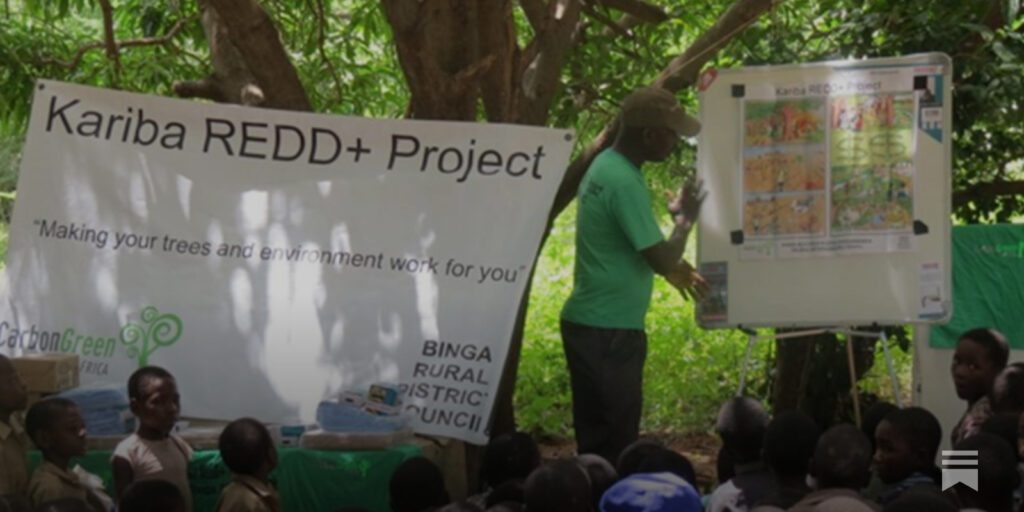With Africa’s digital asset wave Zimbabwe has taken a unique tangent into reviving investor confidence and addressing past regulatory missteps by launching a blockchain carbon registry. This new initiative is designed to enhance transparency and security in carbon credit trading.
Key Takeaways
- Blockchain carbon registry in Zimbabwe ensures immutable audits, boosting investor confidence after past regulatory setbacks.
- Zimbabwe’s registry automates compliance via smart contracts, reducing administrative costs and human error risks.
- Africa’s carbon market expands 15-20% annually, with Zimbabwe leading via blockchain-driven transparency and traceability.
How Zimbabwe’s Blockchain Carbon Registry is Revitalizing Trust in Carbon Credit Trading
The Zimbabwean Ministry of Environment, in partnership with Dubai-based A6 Labs, has officially released a blockchain carbon registry.
The new system records every issuance, trader and retirement of credits on an immovable ledger, fostering trust after the nation’s muddy history with failed carbon projects back in 2022 due to subsequent market instability and regulatory oversight.
As per the announcements, the unique interplay between both technologies is set to democratize access to project data for stakeholders worldwide, providing Zimbabwe with potential new revenue streams.
How the Blockchain Carbon Registry Works
The blockchain carbon registry, hosted on the newly established Zimbabwe Carbon Market Authority portal, will provide real-time verification for carbon credit transactions.
For those new to the term, carbon credit trading enables entities that exceed emission allowances to purchase additional credits beyond limits, financing credible reduction initiatives.
Essentially, manufacturers or utilities that overshoot carbon caps buy tradable certificates representing a metric ton of CO2 equivalent from project developers.
Zimbabwe has provided a unique tangent by introducing transparency in carbon credits, which are often criticized for their opaque verification processes.
CHECK OUT: Digital Fortress: How to Shield Your Web3 World in Africa!
Evelyn Ndlovu, Zimbabwe’s environment minister, boast of the system’s immutability guaranteeing “genuine, measurable, and impactful” credits aligning with the global climate goal.
Some of the key benefits of blockchain in carbon trading:
- Immutable Audits: On-chain hashes prevent document tampering, enabling anyone to verify registration certificates and objection letters.
- Real-time Visibility: Stakeholders gain instant insights into credit status—issuance, transfer, and retirement—fostering trust among investors and local communities.
- Automated Compliance: Smart contracts can enforce regulatory requirements, reducing administrative overhead and human error
This comes at a crucial point for the region after its 2023 policy reversal, which resulted in the government seizing 50% of project revenues and halting operations.
This effectively stifled initiatives like the Kariba REDD+ Project, a landmark effort to protect forests around Lake Kariba.
Restoring Trust Through Transparency
Zimbabwe’s adoption of blockchain technology stems from its need to rectify past breaches of trust.
The government’s abrupt regulatry shits eroded investor confinence causing many forgeign captial to withdraw their interest within the region.
The blockchain carbon registry’s main aim is to counter this offering full traceability, allowing investors to monitor credits, reasuring investors of “sudden” closures.
Developers can now submit compliance applications via the ZCMA’s portal before launching projects, adhering to the CARBON Credits Trading Regulations.

Kariba REDD+ Project showcases much promise in Zimbabwe, but the 2023 mishap significantly halted progress.[Photo: REDD-Monitor]
Regional Impact on Africa’s Carbon Market
Africa’s carbon credit market has showcased plenty of potential in previous years.
For instance, the UAE Carbon Alliance will purchase $450 million of high-quality African carbon credits by 2030. Zimbabwe’s blockchain carbon registry aims to establish credibility by setting a regional benchmark for combating fraud and ensuring equitable benefits for local communities.
In addition, growing renewable energy and sustainable agriculture sectors have provided ample investor interest.
For instance, in Kenya, over 296 carbon offset projects, such as the Kasigau Corridor REDD+ project and the Malindi Solar Farm, have numerous supporters from their concerns.
Zibambwe ranks the world’s 12th largest producer of carbon offsets, generating 4.2 million credits from 30 registered projects in 2024.
This particularly complements the new initiative fostering trust and aligning with the continent’s Web3 trends
Regulatory Framework and Future Outlook
How Zimbabwe uses blockchain for carbon credit provides a unique tangent, especially for regulations.
Initially, the Statutory instrument 48 of 2025 established comprehensive procedures for monitoring, reporting and verification (MRV) of carbon emission reduction projects.
In addition, Harare established the Zimbabwe Carbon Market Authority to oversee licensing, project approval and compliance monitoring.
This dual framework of code-base transition towards transparency and structured governance aims to prevent policy reversal that stalled past projects.
While challenges persist, like scepticism from international investors, this blockchain-driven approach does signal a strategic shift towards sustainable developments.
Minister Ndlovu notes that the system’s success hinges on “regaining global confidence” in the nation’s carbon credits.
Conclusion
Zimbabwe’s blockchain carbon registry isn’t just a technical upgrade; it’s an approach for redemption.
Africa’s carbon credit market continues to grow with stiff competition from peers like South Africa’s Buffelsdraai Landfill Site Community Reforestation Project, Ghana’s GenZero collaboration with Singapore and Ethiopia’s EthioTrees, Zimbabwe establishes an edge.
Incorporating blockchain streamlines the region’s transition into Web3 while showcasing its diligence in rectifying past errors.
The Zimbabwe Carbon Market Authority aims to boost carbon credit trading while increasing its blockchain adoption. Only time will tell of its success, but it provides an impeccable blueprint for growth.
